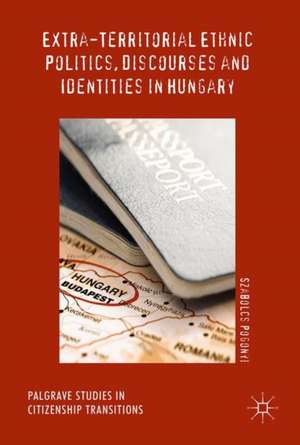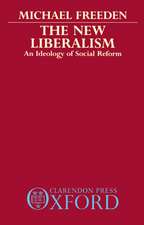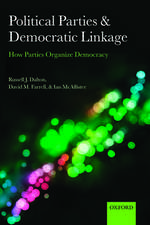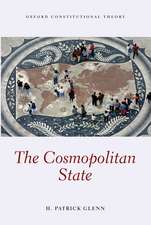Extra-Territorial Ethnic Politics, Discourses and Identities in Hungary: Palgrave Studies in Citizenship Transitions
Autor Szabolcs Pogonyien Limba Engleză Hardback – 28 iul 2017
| Toate formatele și edițiile | Preț | Express |
|---|---|---|
| Paperback (1) | 577.61 lei 38-44 zile | |
| Springer International Publishing – aug 2018 | 577.61 lei 38-44 zile | |
| Hardback (1) | 642.68 lei 6-8 săpt. | |
| Springer International Publishing – 28 iul 2017 | 642.68 lei 6-8 săpt. |
Preț: 642.68 lei
Preț vechi: 756.09 lei
-15% Nou
Puncte Express: 964
Preț estimativ în valută:
122.99€ • 125.95$ • 102.31£
122.99€ • 125.95$ • 102.31£
Carte tipărită la comandă
Livrare economică 18 martie-01 aprilie
Preluare comenzi: 021 569.72.76
Specificații
ISBN-13: 9783319524665
ISBN-10: 3319524666
Pagini: 238
Ilustrații: XIII, 200 p. 8 illus.
Dimensiuni: 155 x 235 mm
Greutate: 0.48 kg
Ediția:1st ed. 2017
Editura: Springer International Publishing
Colecția Palgrave Macmillan
Seria Palgrave Studies in Citizenship Transitions
Locul publicării:Cham, Switzerland
ISBN-10: 3319524666
Pagini: 238
Ilustrații: XIII, 200 p. 8 illus.
Dimensiuni: 155 x 235 mm
Greutate: 0.48 kg
Ediția:1st ed. 2017
Editura: Springer International Publishing
Colecția Palgrave Macmillan
Seria Palgrave Studies in Citizenship Transitions
Locul publicării:Cham, Switzerland
Cuprins
Introduction.- Chapter 1: Citizenship and nation-building in post-Communist Central Eastern Europe.- Chapter 2: Kin-citizenship in the European context.- Chapter 3: Kin-citizenship in Hungary. From external minority protection to transborder nation building.- Chapter 4: Extraterritorial nation-building, inter-state relations and transboder minority mobilizaton in Hungary.- Chapter 5: Citizenship as a commitment: everyday perspectives on non-resident citizenship and voting rights in the Hungarian diaspora.- Conclusion.
Notă biografică
Szabolcs Pogonyi is Associate Professor in the Nationalism Studies Program at Central European University. His current research focuses on diasporic nation building, transborder minorities, non-resident citizenship and external voting.
Textul de pe ultima copertă
This book explores the causes and consequences of the discursive and legal construction of the Hungarian transborder nation through the institutionalization of non-resident citizenship and voting. Through the in-depth analysis of Hungarian transborder and diaspora politics, this book investigates how the political engagement of non-resident Hungarians impacts inter- and intra-state ethnic relations. In addition, the research also explores how institutional changes and shifting discursive strategies reify and redefine ethnic belonging narratives and the self-perception of Hungarians living outside the country. The research uses a multidisciplinary qualitative methodology which includes institutional (historical, rational choice and sociological) analysis, discourse analysis as well as interpretive methods. Through the inventive application of multiple methodologies, the book goes beyond the mostly institutional/legal analysis dominant in the study of citizenship.
Caracteristici
Goes beyond the mostly institutional/legal analysis dominant in the study of citizenship Offers a comprehensive overview of citizenship debates in postcommunist Central and Eastern Europe Examines the bottom-up impact of nationalist discourses and policies on the nationhood conceptions of Hungarians living outside the country




















